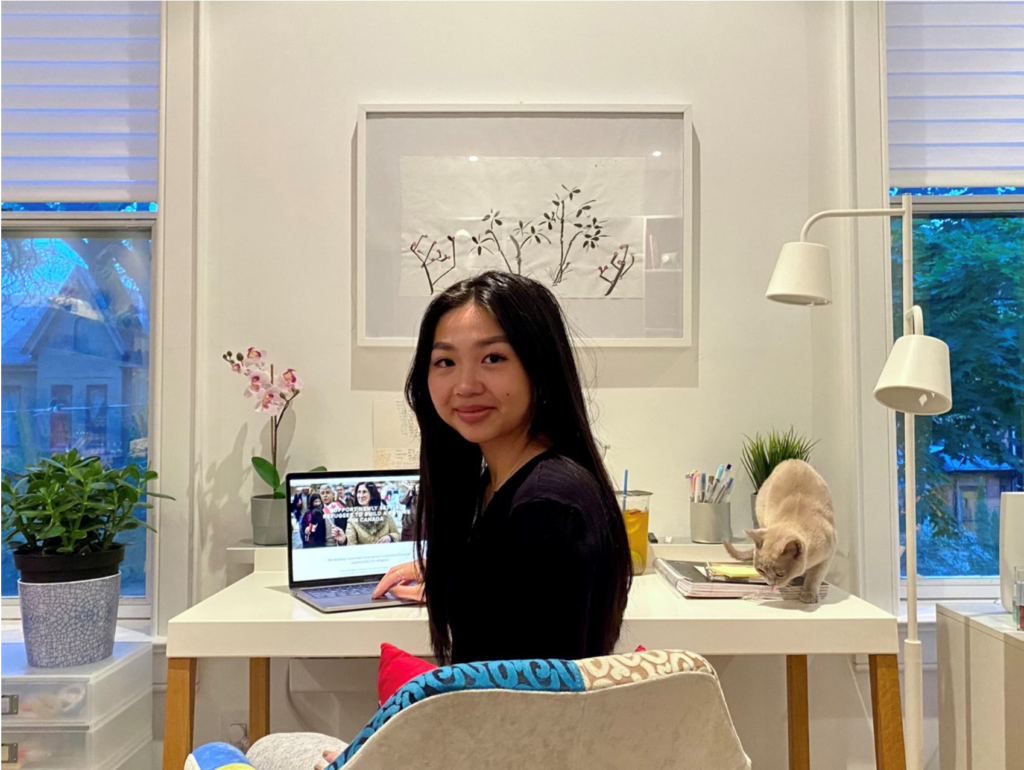This blog post is the last of a series of student articles on their activities during Summer 2020. Astrid Ling (’18) was an intern with Jumpstart Refugee Talent, a refugee-led non-profit working to economically empower newcomers to Canada through employment and education opportunities. Read about what her takeaways and lessons were below.
By Astrid Ling
As a Peace, Conflict and Justice major, I am familiar with the general causes and consequences of conflict. What is not taught in the classroom, however, is the human experience of conflict – including what it’s like to rebuild in a new country as a refugee. I got a glimpse into this experience over the summer as an intern through PCJ499 at Jumpstart Refugee Talent, a refugee-led non-profit organization working to economically empower refugees in Canada. For three months, my main task was to pair newly settled refugees with Canadian professionals (mentors) in their industry. It was listening to clients tell their stories that had the greatest impact on me. Here are the challenges, lessons and skills that I took away.
One of the greatest economic challenges facing refugees in Canada is a lack of professional connections. In fact, a 2016 LinkedIn study found that 85% of North Americans secure their jobs through networking. In addition, newcomers must adapt to Canadian workplace culture, with its indirect communication styles and emphasis on soft skills over technical ones. While there are organizations like Jumpstart dedicated to meeting these challenges, other barriers are more systemic.
Two examples of discrimination come to mind: refugee status and foreign qualifications. In terms of legal status, refugees in Canada are usually sponsored before arrival, or apply for refuge from within Canada. Those in the latter category, refugee claimants, can face discrimination in the hiring process because their legal status is viewed as unstable. In terms of qualifications, some companies discriminate against the foreign credentials of newcomers. At Jumpstart’s national webinar event for World Refugee Day, one refugee panellist expressed the frustration she feels over consistently being told to attain new degrees despite holding multiple international credentials.
These challenges – and the common feelings of frustration and discouragement – stand out to me. For many in this country, challenges and barriers to employment feel never-ending and relentless. In this way, my understanding of conflict has shifted. In the absence of immediate harm, conflict endures through the challenges and systemic barriers that refugees face even as they attempt to rebuild.
How do we meet these obstacles? We can start by elevating refugee voices in the policies and organizations that serve them. My favourite fact about Jumpstart is that it is a refugee founded and led organization. The Jumpstart team understands that in order to address the real needs of refugees in Canada, you must first listen to their stories. In doing so, we also recognize the diversity of refugee experiences and the value and expertise they bring to Canadian workplaces.
These ideas resonate with me. Perhaps it’s because they echo a discussion from my Munk One days – the infamous PlayPump lesson. The Roundabout PlayPump intervention sought to harness the energy of children’s play to power water pumps in South Africa, but failed when children stopped playing with them. Its failure highlights the importance of partnering with communities to address their needs rather than intervening on misguided notions.
In addition to valuable learnings and lessons, there were moments of connection that really moved me. One of the best feelings was having a mentee-mentor match hit it off right away, bonding over shared languages or having children the same age. Another was listening to mentors share their own tales of perseverance and hope, many of them once newcomers to Canada themselves. I was constantly amazed by mentees’ openness and curiosity, and their mentors’ generosity of time and spirit.
In all, I think the greatest skill I learned this summer is one we are taught as children – how to listen. When I chose to engage with and relate to stories shared by refugee clients, I connected to an experience I wouldn’t otherwise know and deepened my understanding of topics discussed in class. The global events of the last few months have underscored the importance of listening to other people’s stories and experiences without implicating our own. Let us all remember to elevate the voices of others, especially the marginalized, as we pursue positive change.
